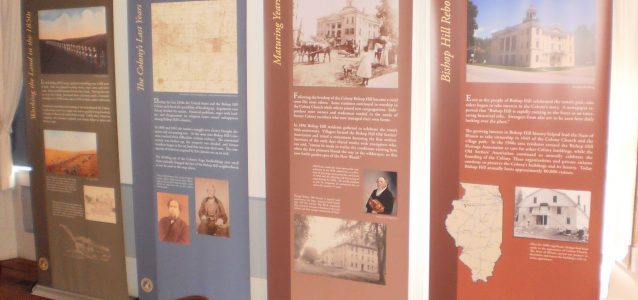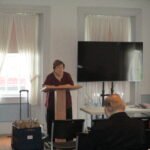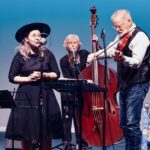The following is a press release issued by Western Illinois University about our traveling exhibit: You can click on the following link to read it online as well https://qconline.com/news/local/education/bishop-hill-exhibit-plans-macomb-moline-visits/article_41c81a8b-d89c-5ebb-9baa-51e1cc5c4065.html
The Western Illinois University Department of History and University Libraries will host a new traveling exhibit on the history, heritage and impact of Bishop Hill Feb. 11-March 18.
The exhibit, A Community on the Prairie: Bishop Hill, Illinois, will be displayed on the Macomb campus in the Garden Lounge of Malpass Library.
“This exhibit will help to not only showcase Illinois history but also demonstrate the rich diversity that has shaped our state,” said WIU Dean of Libraries Michael Lorenzen “The WIU Archives has even more information on Bishop Hill, and this exhibit is a great starting point to learn about it.”
The exhibit features a talk by School of Global Education and Outreach Executive Director Jeff Hancks at 3:30 p.m. Feb. 26 in the Garden Lounge of Malpass Library. Hancks’s talk is titled “Searching for the Perfect Society: Illinois and the Nineteenth-Century Utopian Movement.”
“Dr. Hancks’s talk will contextualize Bishop Hill in the development of Illinois and demonstrate the history of our region,” said WIU History Department Chair Jennifer McNabb. “I am delighted that he has agreed to share his research in conjunction with the Bishop Hill exhibit.”
In March, the Bishop Hill exhibit will move to the WIU-QC campus in Moline where it will be displayed in the WIU-QC Library March 18-April 15.
“We are thrilled to host A Community on the Prairie: Bishop Hill, Illinois at Western Illinois University-Quad Cities Library,” said Tom Finley of the WIU-QC Library. “Many Swedish immigrants came to the Quad Cities, and their descendants are very much with us today. This will generate great interest.”
The Bishop Hill Heritage Association, in partnership with the Bishop Hill State Historic Site, created the traveling exhibit about the formation of the religious communal colony founded in 1846 by Eric Janson and his followers. The colony survived for only 15 years but left a lasting legacy in immigration history.
By 1930, 20 percent of all Swedish people in the world lived in the U.S. Immigration experts agree that much of this Swedish exodus to Illinois and the United States can be traced to the impact of the Bishop Hill Colony.
Because of Bishop Hill’s importance to Swedish migration, the community is a state historic site and National Historic Landmark. Eighteen colony buildings still remain and are in use today.
A Community on the Prairie: Bishop Hill, Illinois was produced by the Bishop Hill Heritage Association and the Bishop Hill State Historic Site with financial support from the Barbro Osher Pro Suecia Foundation, the Swedish Council of America and the Illinois Arts Council Agency, a state agency. The talk and the exhibit are open free to the public.









 News & Events
News & Events


